|
|
|
Sort Order |
|
|
|
Items / Page
|
|
|
|
|
|
|
| Srl | Item |
| 1 |
ID:
169863
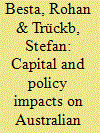

|
|
|
|
|
| Summary/Abstract |
This paper investigates whether capital constraints are evident for uptake of small-scale solar photovoltaic installations, using cross-sectional regressions with Australian regional data up to March 2019. There is an inverse U-shaped relationship between a number of different measures of capital and small-scale solar installations for both the 0–10 and 10–100 kW capacity categories. The positive relationship between capital and solar installations at the low end of the capital distribution suggests that capital constraints may provide an ongoing challenge for policymakers seeking to encourage the uptake of small-scale solar installations. There is also a negative association between average income and small-scale solar installations. Policymakers seeking to increase small-scale solar installations may achieve efficiency gains by targeting capital constraints rather than income constraints. An effective capital subsidy for addressing capital constraints, the Small-scale Renewable Energy Scheme, has had a substantial impact on solar uptake for systems in both the 0–10 and 10–100 kW capacity categories. In contrast, there is a lack of evidence of a substantial effect of several other policies targeting community organisations.
|
|
|
|
|
|
|
|
|
|
|
|
|
|
|
|
| 2 |
ID:
126602
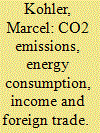

|
|
|
|
|
| Publication |
2013.
|
| Summary/Abstract |
The effect of trade liberalisation on environmental conditions has yielded significant debate in the energy economics literature. Although research on the relationship between energy consumption, emissions and economic growth is not new in South Africa, no study specifically addresses the role that South Africa's foreign trade plays in this context. A surprising fact given trade is one of the most important factors that can explain the environmental Kuznets curve. This study employs recent South African trade and energy data and modern econometric techniques to investigate this. The main finding of interest in this paper is the existence of a long run relationship between environmental quality, levels of per capita energy use and foreign trade in South Africa. As anticipated per capita energy use has a significant long run effect in raising the country's CO2 emission levels, yet surprisingly higher levels of trade for the country act to reduce these emissions. Granger causality tests confirm the existence of a positive bidirectional relationship between per capita energy use and CO2 emissions. Whilst the study also finds positive bidirectional causality between trade and income per capita and between trade and per capita energy use, it appears however that trade liberalisation in South Africa has not contributed to a long run growth in pollution-intensive activities nor higher emission levels.
|
|
|
|
|
|
|
|
|
|
|
|
|
|
|
|
| 3 |
ID:
118867


|
|
|
| 4 |
ID:
185086
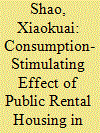

|
|
|
|
|
| Summary/Abstract |
China's public rental policy creates opportunities for poor households to rent apartments at low rental prices. In addition to such an impact, we argue that public rental housing increases the purchasing power of the poor and therefore enhances the income elasticity of consumption, i.e., the percentage of consumption increment due to a 1 percent increase in income. Based on a nationwide dataset from China, the Chinese Household Income Project 2018, we find that public rental housing significantly increases the marginal impact of household disposable income on consumption. Specifically, our analysis suggests that public rental apartments could increase the income elasticity of consumption demand by 18 percent among all rental households and by 24 percent among rental households with below-average income. We also find that the effect of public rental housing on income elasticity of consumption is stronger for service consumption than for nonservice consumption. These results suggest that a well designed public rental policy could not only promote consumption in favor of the service industry but also alleviate the undesirable consequences of the unbalanced consumption structure caused by income inequality.
|
|
|
|
|
|
|
|
|
|
|
|
|
|
|
|
| 5 |
ID:
029948
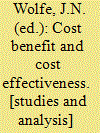

|
|
|
|
|
| Publication |
London, George Allen & Unwin Ltd., 1973.
|
| Description |
236p
|
| Standard Number |
0-04-338059-X
|
|
|
|
|
|
|
|
|
|
|
|
Copies: C:1/I:0,R:0,Q:0
Circulation
| Accession# | Call# | Current Location | Status | Policy | Location |
| 011644 | 658.1554/WOL 011644 | Main | On Shelf | General | |
|
|
|
|
| 6 |
ID:
029302


|
|
|
|
|
| Publication |
London, George Allen & Unwin Ltd., 1972.
|
| Description |
248p.Hbk
|
| Standard Number |
0-04-336043-2
|
|
|
|
|
|
|
|
|
|
|
|
Copies: C:1/I:0,R:0,Q:0
Circulation
| Accession# | Call# | Current Location | Status | Policy | Location |
| 011188 | 658.1554/NEW 011188 | Main | On Shelf | General | |
|
|
|
|
| 7 |
ID:
156471
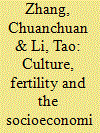

|
|
|
|
|
| Summary/Abstract |
This paper aims to study the effect of culture on economic outcomes by focusing on one unique fertility norm in China: the belief of continuing the family line. Using the national representative household survey data, we successively examine the fertility behavior and socioeconomic status of women in regions of China with varying beliefs regarding continuing the family line. We show that this local fertility norm has positive and significant effects on the fertility behavior, including the number of births; sex selection biased towards boys; and the education, employment status, and income of women. We also show that the gender gaps in education, labor supply, and income are significantly larger in regions where the belief of continuing the family line is stronger. Our results are robust to the control for reverse causality issue by measuring the local fertility norm using the beliefs of the older generation.
|
|
|
|
|
|
|
|
|
|
|
|
|
|
|
|
| 8 |
ID:
172622


|
|
|
|
|
| Publication |
New Delhi, Oxford University Press, 2020.
|
| Description |
xxxv, 364p.: figures, tables, Boxeshbk
|
| Standard Number |
9780190121112
|
|
|
|
|
|
|
|
|
|
|
|
Copies: C:1/I:0,R:0,Q:0
Circulation
| Accession# | Call# | Current Location | Status | Policy | Location |
| 059887 | 338.95492/AFS 059887 | Main | On Shelf | General | |
|
|
|
|
| 9 |
ID:
181145
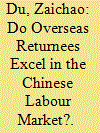

|
|
|
|
|
| Summary/Abstract |
Overseas study is a global phenomenon and a major business internationally. But does overseas study pay off? Using data from the 2015 China Household Finance Survey (CHFS), we examine the labour market performance of overseas returnees in China. To obtain more accurate results, we matched each returnee with a local so that the domestic group is as similar as possible to the returnee group. We then conducted empirical analyses of the matched data. We find that compared with domestic postgraduates, returnee postgraduates earn about 20 per cent more annually. Moreover, the salary premiums paid for foreign graduate degrees can be attributed principally to the superior human capital gained from overseas education rather than from any “signalling” effect. Also, returnees with graduate degrees are more likely to enter high-income professions and foreign-funded ventures, and to reach higher positions in those organizations. However, we find no significant differences in income, occupation choices and positions between returnee and local bachelor's degree recipients. As such, we suggest that Chinese students and their families are best served when the students obtain a local undergraduate degree and then go overseas for graduate training.
|
|
|
|
|
|
|
|
|
|
|
|
|
|
|
|
| 10 |
ID:
147897


|
|
|
|
|
| Summary/Abstract |
This article aims to address the extent of income that has been attributed by trade between India and the ASEAN-5 countries (namely, Indonesia, Malaysia, the Philippines and Thailand) from the year 1970 till 2014. This study adopts the autoregressive distributed lag (ARDL) bound test approach to cointegration, with long- and short-run parameter estimates to investigate the impact of regional trade between India and ASEAN-5. The cointegration test results confirmed the presence of a long-run relationship only for India, and no cointegration evidence was found for the ASEAN-5 economies. The long-run parameter estimates showed no influence of ASEAN–India trade on India’s income and a positive impact of India’s trade to the rest of the world on India’s income by about 0.58 per cent in the long run. Interestingly, ASEAN–India trade is positively influencing India’s income in the short run, and the extent of the impact tends to be small. This article concludes that there is limited evidence to support the claim that ASEAN–India trade stimulates income for the case of India and ASEAN-5 countries.
|
|
|
|
|
|
|
|
|
|
|
|
|
|
|
|
| 11 |
ID:
155299
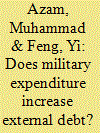

|
|
|
|
|
| Summary/Abstract |
This article empirically explores the effect of military spending on external debt, using a sample of ten Asian countries over the years from 1990 to 2011. The Hausman’s test suggests that the random-effects model is preferable; however, both random-effects and fixed-effects models are used in this research. The empirical results show that the effect of military spending on external debt is positive, while the effects of foreign exchange reserves and of economic growth on external debt are negative. For developing countries caught in security dilemma, military expenditure often requires an increase in external debt, which may affect economic development negatively.
|
|
|
|
|
|
|
|
|
|
|
|
|
|
|
|
| 12 |
ID:
092543
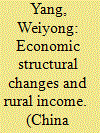

|
|
|
|
|
| Publication |
2009.
|
| Summary/Abstract |
During the reform period, the Chinese rural economy has experienced deep structural changes: cropping adjustment, agro-forestry adjustment and agro-industrial adjustment. At the same time, rural per capita income rose sharply despite some fluctuations. Using a panel data of 29 provinces from 1982 to 2001, effects of these structural changes upon both income level and income instability are assessed. The empirical results show that crop adjustment and agro-industrial adjustment can increase rural income and reduce income instability, while agro-forestry adjustment reduces both income and its instability, as a risk-management strategy.
|
|
|
|
|
|
|
|
|
|
|
|
|
|
|
|
| 13 |
ID:
133196
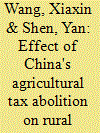

|
|
|
|
|
| Publication |
2014.
|
| Summary/Abstract |
This paper uses the rural household panel data collected by Research Center for Rural Economy to evaluate the impacts of China's agricultural tax abolition during 2004-2005 on farmers' income and production behavior. We find that the abolition of agricultural tax did not significantly affect agricultural production. The effects on input use and productivity are also found statistically insignificant. All these are consistent with the lump-sum property of the tax and imply little effect of the tax abolition on relaxing credit constraints to farmers. Finally, we find that the tax abolition did not increase farmers' net income significantly
|
|
|
|
|
|
|
|
|
|
|
|
|
|
|
|
| 14 |
ID:
029150


|
|
|
|
|
| Publication |
London, George Allen and Unwin Ltd., 1972.
|
| Description |
151p.Hbk
|
| Standard Number |
0-04-300035-5
|
|
|
|
|
|
|
|
|
|
|
|
Copies: C:1/I:0,R:0,Q:0
Circulation
| Accession# | Call# | Current Location | Status | Policy | Location |
| 011182 | 658.1554/MIS 011182 | Main | On Shelf | General | |
|
|
|
|
| 15 |
ID:
146883


|
|
|
|
|
| Summary/Abstract |
Drawing upon data from the Deployment Life Study, this article examines whether female military spouses (SPs) are disadvantaged relative to matched civilian peers in terms of hours worked and earnings, paying particular attention to gaps among the highest educated women. Female SPs do earn less than comparable civilian peers in terms of raw dollars and percentage earnings. Moreover, military wives who are part of the labor force work as many hours as their civilian counterparts, but still earn significantly less for that work. Contrary to predictions, the most educated SPs are not disproportionately affected compared to spouses with less education. These results suggest that SPs at all education levels could benefit from employment assistance; in particular, women already participating in the labor force may benefit from support in finding higher paying jobs.
|
|
|
|
|
|
|
|
|
|
|
|
|
|
|
|
| 16 |
ID:
181783
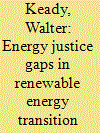

|
|
|
|
|
| Summary/Abstract |
This study examines how renewable energy policies in Vermont address energy vulnerability and energy justice. Using an anti-resilience framework, and drawing on 569 surveys and 18 interviews statewide, our results demonstrate higher energy vulnerability—lack of access to sufficient and affordable energy—among respondents who are low-income, non-white, and renters. Low-income and renter respondents were over three times more likely, and non-white respondents were seven times more likely, to report going without heat. While Vermont is regarded as a renewable energy leader, its current policies do not equitably distribute household transition benefits (HTBs) to address vulnerability. Our results show that non-white respondents were seven times less likely than white respondents to report having solar panels and renters were three times less likely than homeowners to report having solar panels. Interviews also reveal HTBs are available mostly to high-income households. We argue that these disparities may result from structural discrimination and policies that distribute HTBs to households with disposable income and property rights. The unequal distribution of this ‘investment capital’ prevents widespread access for non-white, low-income, and renting households. Following an anti-resilience framework, we propose alternative policy frameworks that center justice within energy transition policy making.
|
|
|
|
|
|
|
|
|
|
|
|
|
|
|
|
| 17 |
ID:
121112


|
|
|
|
|
| Publication |
2013.
|
| Summary/Abstract |
Contemporary India possesses a food security paradox-progress in combating food insecurity is occurring at a slower pace than might be expected, given the nation's rapid economic growth. This paper provides a conceptual framework to explain this phenomenon. Drawing on the work of Amartya Sen, it uses a broadly framed analysis to conceptualise the problem in terms of the interactivity between three types of entitlement failure. Firstly, pure exchange system entitlement (abilities to obtain food from welfare programmes) has been curtailed by institutional shortcomings in pivotal programmes. Secondly, opportunities for wage-labour entitlement (abilities to obtain food from monetary incomes) have been restricted for vulnerable households because of the sequencing and geographical patterning of recent economic growth in India. Thirdly, opportunities for vulnerable households to address their needs through own-production entitlement (abilities to grow one's own food) have been curbed by land fragmentation and environmental degradation. These interactions have created vicious cycles of food insecurity for vulnerable households. Through this approach, the deeper causal roots of India's food security paradox are articulated, thus underscoring the importance of multi-pronged, holistically constructed policy agendas.
|
|
|
|
|
|
|
|
|
|
|
|
|
|
|
|
| 18 |
ID:
104862


|
|
|
| 19 |
ID:
173986


|
|
|
|
|
| Summary/Abstract |
Small-scale fisheries play a significant role as a source of employment, livelihood strategy and contributor to food security. However, changes in climatic variables alter the productivity and distribution of marine and freshwater fish species, negatively affecting the livelihoods of fishery-dependent communities. This study seeks to identify small-scale fishers’ livelihoods and examine the impacts of climate change on livelihoods and food security of small-scale fishing households. The study was conducted in Sanyathi fishing basin in Lake Kariba, Zimbabwe. The Sustainable Livelihood Approach framework of the Department for International Development was used to define the small-scale fishers’ livelihood assets and activities. The study employed a mixed-method approach for data collection. A pretested, semi-structured questionnaire, focus group discussions and observations were used to collect data from the small-scale fishers. The data collected were subjected to descriptive and bivariate analysis. The present results indicate that fishing is the community’s primary livelihood activity. More than 62% of fishermen stated that fishing revenue is declining, owing to declining fish catches. Of participants, 98% recognised food purchases as the primary source of food. Therefore, 78% of the small-scale fishers perceive their households to be food insecure due to declining incomes from fisheries. These findings show the need for policymakers and development agencies to formulate strategies that specifically target fishing communities whose livelihoods rely on natural ecosystems.
|
|
|
|
|
|
|
|
|
|
|
|
|
|
|
|
| 20 |
ID:
148632


|
|
|
|
|
|
|
|